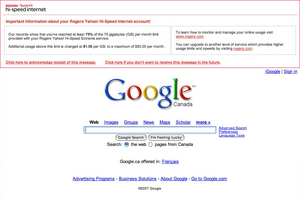Here in Canada, the big ISPs are cable television giant Rogers Cable, telephone giants Bell Canada and Telus, and American network giant America Online.
These large corporate ISPs provide dedicated, high-speed broadband Internet access on their own proprietary networks.
However, many more subscribe to smaller third-party ISPs that offer disco
 Image via Wikipedia
Image via Wikipedia
This provides competition in the ISP market, as the smaller ISPs compete against the very same larger companies providing them with network access, driving down prices while providing more options for consumers.
 Image via Wikipedia
Image via Wikipedia
That was until last year, when the Canadian government wiped clean from the rule books the law requiring the big ISPs to provide access to their networks (for a fee) to the smaller third-party carriers. This came in the form of a ruling by the Canadian Radio-television and Telecommunications Commission (CRTC) that said that Bell and Telus no longer had to provide access to their broadband Ethernet network to the smaller competitors.
Winnipeg-based Manitoba Telecom Systems (MTS) has appealed the CRTC ruling, and a decision will be made by the Canadian government by the end of the year.
MTS was bought out by Allstream, a larger telecom company, but still a dwarf when compared to the large ISPs in Canada.
Since then, the smaller carriers and their customers have
 Image via Wikipedia
Image via Wikipedia
Although the third party carriers may be smaller than the ‘big boys,’ they pack a big punch. A campaign by MTS last month has generated over 85,000 angry letters to Members of Parliament (MPs), backing them and their cause.
What is that cause?
The Coalition for Competitive Broadband – led in part by MTS and over 50 other third-party ISPs – says the CRTC has failed to ensure a competitive marketplace for Internet services, and has failed to look out for the interests of Canadians.
"This cabinet recognizes that government has a role to play in ensuring healthy competitive conditions," said Chris Peirce, chief corporate officer for MTS Allstream, in a statement. "There's a wealth of evidence that the CRTC has no idea how to ensure competition, and that is why the government must continue to direct the CRTC."
It’s all about competition in a fair and level playing field for the coalition.
The coalition says that without proper access to the primary ISP’s networks, Internet rates will increase, reducing access to the Internet for the poor, and severely limiting small and medium businesses access to the Internet. The coalition references numerous global studies, backing their claims.
Meanwhile, Bell and Telus poo-poo these studies, simply saying they are wrong. They point out that Canada is world leader when it comes to broadband technologies. Bell and Telus say the smaller third-party ISPs don’t care about competition; they just want access to their big broadband networks for below market prices.
Competition in the telecom industry continues to flop. Back in the 1990’s, the CRTC paved the way for deregulation in the telephone sector, allowing consumers to choose which company they wanted to do business with for their telephone needs.
At first BCE, the parent company of Bell Canada, and all the other su
 Image via Wikipedia
Image via Wikipedia
Smaller mom and pop phone companies popped up briefly, re-selling phone services to consumers. Most of these got gobbled up by Bell, and the other big telecoms. The ones which remain, tend to be Voice Over Internet Protocol (VOIP) based companies, which don’t need to lease telephone lines for their services.
In fact, the only competition that really exists in the telephone sector in Canada is between a select few big companies. A handful of American companies have entered the mobile phone market – Virgin for one – but for the most part, Canadians don’t enjoy a free and open market in telecom.
The prices are driven by an elite group of suits and ties ruling the industry through their supersized companies.
There is just as little competition in the high-speed broadband Internet market.
It’s all the same companies – unless you go with one of the smaller third-party resellers, who – if the CRTC ruling stands – may one day pull the plug on your Internet service.
Canada is one of the most wired countries on the planet – studies constantly tell us that. But that doesn’t mean we have a competitive market, full of choice. On the contrary – our Internet – just as our telecom network – is one of the most monopolistic in the world.
So much for a free market.
![Reblog this post [with Zemanta]](http://img.zemanta.com/reblog_b.png?x-id=414393a2-56e3-4e9d-85d7-1edc1918ca8e)








No comments:
Post a Comment